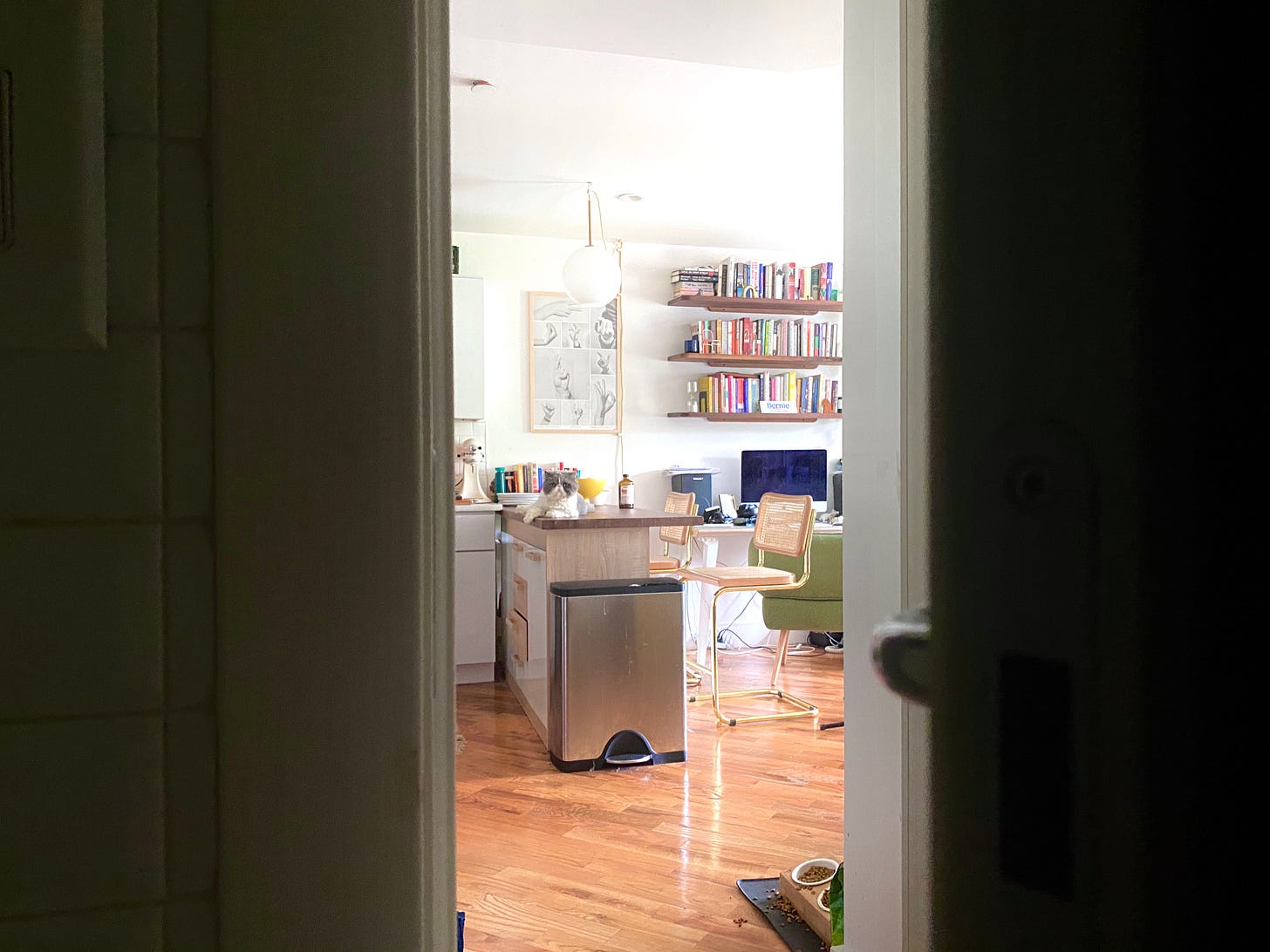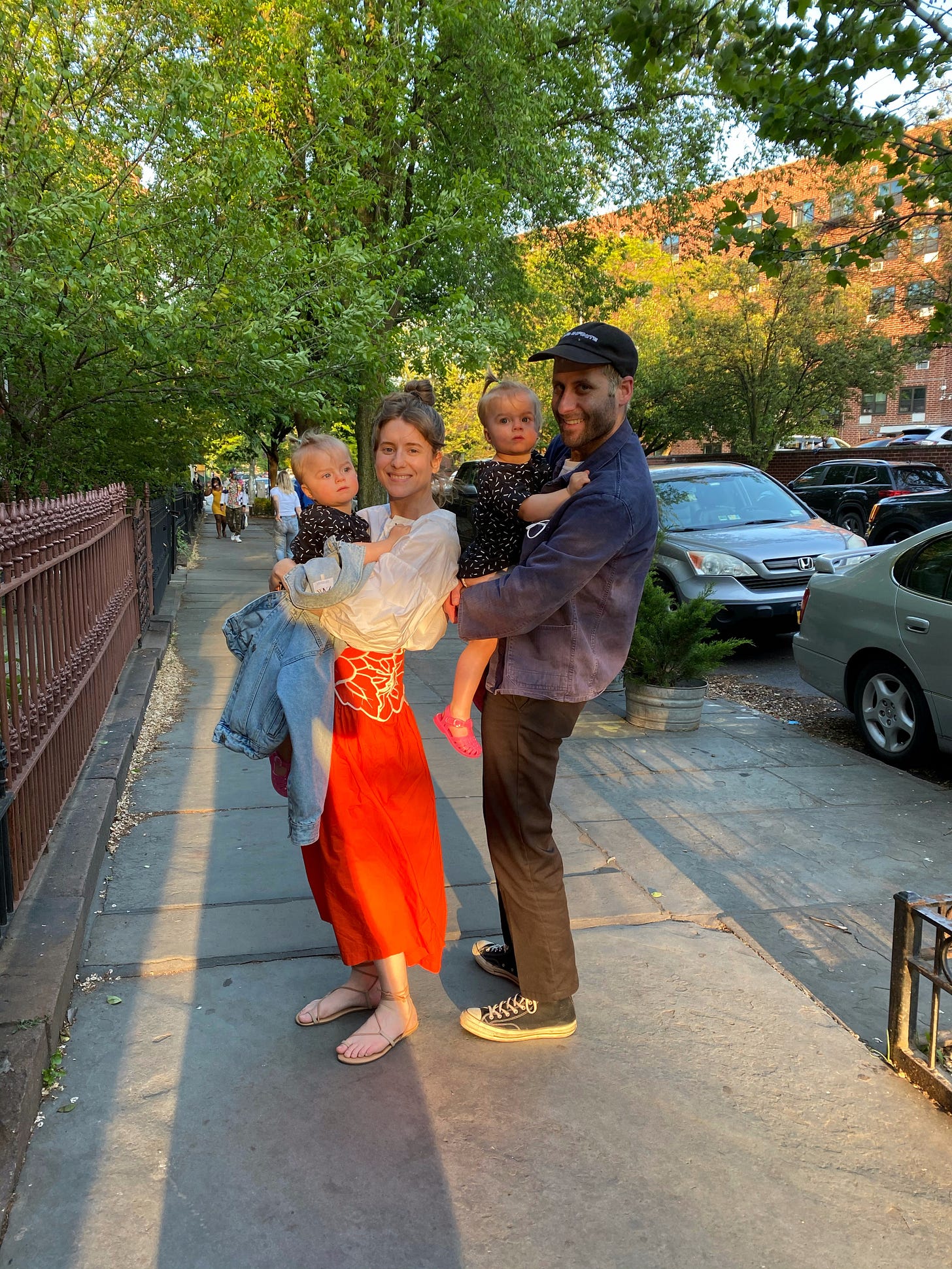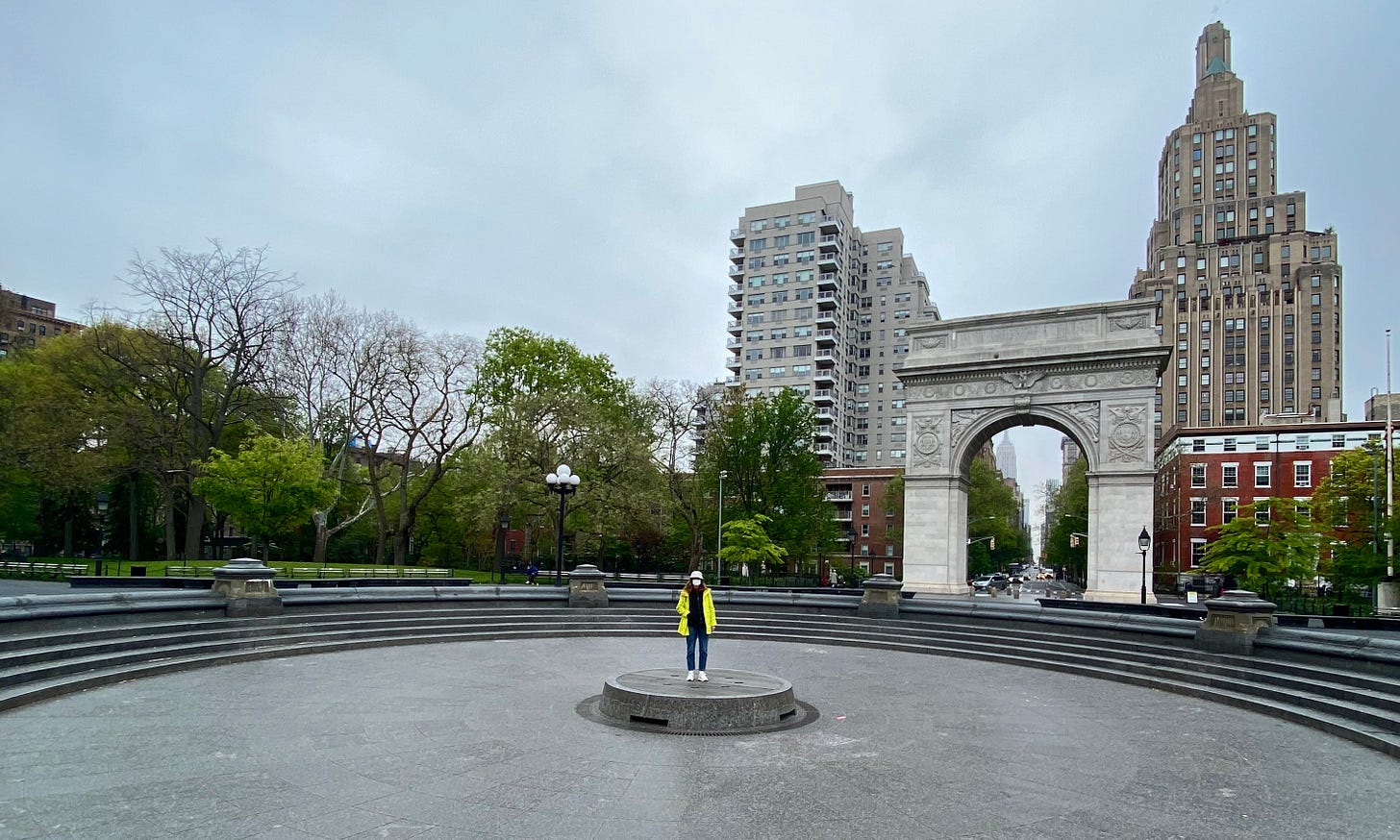Good morning! Welcome to Maybe Baby no.7 and day infinity in quarantine. Today I’m experimenting with putting a song of the week at the top of the newsletter. I listened to this one the other day while I transferred eight Pillsbury buttermilk biscuits from a can to a baking sheet. Twelve minutes later I ate three of them in some kind of fugue state. Hope that sets the right tone.
Synesthesia
Every day around 4 p.m. my upstairs neighbor exercises for 30 minutes. I’m not sure what his routine entails, but oddly there is no variation to the sound—only heavy, rhythmic thumps, like he’s jumping up and down while holding a cinder block. Avi usually sighs and says something like, “Here we go…” whenever it starts. But I find the sound strangely comforting. It makes me feel like I’m inside something big and hollow, or like I’m listening to our building’s heart beat. I always wish it would continue for longer than it does. And when it stops I imagine our neighbor collapsed on the ground, chest heaving, shirt stuck to his skin. I silently congratulate him. It’s almost like we’re hanging out.
I’ve never minded other people’s ticks, taps, thumps. I loved when the kid in front of me in math class rapped his pencil against the desk, or the girl behind me shook her foot back and forth against the leg of my chair. I can still remember the way my friend Stephanie’s mom cut our sandwiches in half after school, her knife scraping slowly and precisely across the wooden cutting board. My synesthesia for movement and sound is often called ASMR—a pleasant, tingly response to visual and auditory triggers—and that’s definitely part of it, but it’s always felt more than just sensory to me. Beyond the occasional chill up my spine, these experiences of other people’s physicality have always brought me a sense of peace. They’re like a metaphysical reminder that I’m not alone, or maybe that I’m insignificant, which might be the same thing.
I miss the timbre and flow of everyday life. I miss watching girls apply makeup on the train before work, dabbing beige powder on their eyelids and pulling a mascara wand up and up until their lashes stand thick and tall. I always wish I could watch them unselfconsciously, that they’d know I wasn’t judging but admiring their easy, practiced movements. I miss simply existing in the presence of other people—watching them order their coffees, or write their to-do lists, or stop what they’re doing to comb their hair into a ponytail. Pre-covid, I used to daydream about working in an office before everything went digital; hearing the pens on paper, the cutting, the folding, observing everyone’s movements in service of something tangible. It must have been nice.
So much of modern life now seems to be engineered specifically to separate us and prevent movement, and quarantine has taken this principle to its logical extreme, replacing the last vestiges of our physical lives with their palliative digital counterparts. It makes me feel numb and lonely.
Avi knows this, and so sometimes he’ll spend twice the amount of time chopping a green onion than is really necessary, or will sketch near me just so I can hear the scratchy sound and absorb his concentration like a weighted blanket. But then other times he’ll apologize for playing the same chords over and over on his guitar—he’s been practicing one song for weeks—and I’ll tell him, “No no I like it” and I’m not sure he really understands what I mean. That what I enjoy is simply the texture of his existence, however it manifests, even if it’s repetitive. It’s the same reason I like the thumping of my upstairs neighbor’s exercise. It’s like proof that he’s there, living and breathing right above me, needing to feel less dead, and so picking himself up for the both of us.
Never Alone in Isolation
But even as I so badly miss the milieu of city life, I also miss being alone. Truly alone. With no one to observe when I wake up, or where I choose to sit, or what I eat for lunch. Avi doesn’t mean to watch me do these things, or I him, but in our small space we have no choice but to see each other all the time. How is it that real solitude has never felt so inaccessible to me as it has in quarantine? It’s so ironic you almost have to respect it.
An example: Our bathroom sits between our bedroom and our kitchen, and because the bathroom door has a ghostly habit of slamming shut, we often use a doorstop to prop it open. When I pee, I don’t usually un-stop it, because it feels like more trouble than it’s worth, and I’m only peeing! But in quarantine, Avi often takes his conference calls in the kitchen, and sits in such a way that when I’m on the toilet, his line of sight and my line of sight directly intersect, and so it happens almost every day that I accidentally look him dead in the eye as I’m peeing, and he accidentally meets my gaze as he’s nodding along to something a creative director is saying about a website’s navigation bar, and we break into laughter, because really it’s not ideal for anyone involved, and at a certain point we have to ask ourselves whether we have literally any boundaries at all.

This is from the POV of my bathroom. Now imagine you’re peeing and Bug is Avi on a conference call.
Before we were trapped like this, I thought we took boundaries pretty seriously. I always connected with the idea that, as the poet Rilke once put it, “the highest task of a bond between two people is that each should stand guard over the solitude of the other.” We regularly offered each other alone time, or asked for it ourselves. I remember Avi once bar-hopped through the East Village by himself on a rainy Tuesday night just so I could have the apartment to myself when I needed it. Other times I would write in a coffee shop so he could work on music or just sit around without dedicating some sliver of his consciousness to wondering if I was noticing him. I think that’s important—existing without thinking about your existence through the eyes of someone else, even if that person is someone who loves you. I want it for myself and for you, too. I want it for the girls putting on makeup on the train.
But even as this kind of respect feels increasingly urgent for people cohabiting in small spaces, it has become oddly muted by what’s even possible. It can feel futile, for instance, to communicate your needs right now—like by saying, “I need to be alone,” or “I need to see my friends,” or “I need to feel okay”—when they simply cannot be met because of everything going on. Or maybe they can be met in an unconventional or temporary sense, but I think most of us understand, on a cellular level, that this time is and will continue to be one of endurance. That it will test our ability to navigate discomfort without our typical roadmap or any clear destination in mind. This has the effect of making everything feel mildly pointless.
The Bad Kind of Irony
Isolation so often feels like being pulled in several opposing directions—towards people but also solitude; work but also relaxation; freedom but also security—none of which can ultimately be satiated. This morning I went for a walk, desperate for some sense of release, and I couldn’t shake the sensation that my cotton mask felt like a warm hand wrapped around my mouth, suffocating me. Whenever I reached an empty block I would yank it off and take a deep breath, only to then feel guilty and paranoid. And given everything, doesn’t that make a cruel kind of sense—that the only thing that can secure our health when we go out is also the thing that robs going out of the very qualities that make it feel vital? Fresh air, nature smells, friendly faces?
Maybe that’s a cynical way to look at it, but sometimes this pandemic feels designed specifically to breed despair: to highlight the cracks in our infrastructure and the leadership in charge of fixing it; to ravage our healthcare system right as the only candidate dedicated to reforming it was pushed out by monied interests; to make the rich even richer as the poor get poorer; to deepen xenophobia just when the end of Trump’s reign seemed within sight; to drive us all apart right when we desperately needed to lean on each other. Nevermind that it struck New York right as spring hit, the season famous for reminding us what it’s like to be hopeful. Or that the only way to protect our physical wellbeing right now is to be pushed to our mental breaking point. The irony is brutal and endless. As my brother recently put it, it’s almost enough to make you believe in a vengeful god. But then you remember it’s simply the logical conclusion of human greed.
I’m not saying this to make you (or me) feel worse, but to acknowledge the uniquely frustrating quality of this situation, and perhaps explain why it feels like the existential equivalent of a hand wrapped around our mouths, leaving most of our senses intact except for the one we actually need: to just breathe. Sometimes I’m comforted to remember that existing has to be enough right now, given everything. That in a way, this is our collective alone time, the prying eyes and expectations of normal life turned away just this once. Maybe no other kind of pause could be so revealing.
15 Things I Consumed Last Week
This interview with Perfume Genius in The New Yorker. He’s so cerebral and interesting; I don’t think you have to be a fan of his music or his Twitter to get a lot out of it. (Also, his new album.)
Dave, the Hulu show starring and written/produced by Dave Burd a.k.a. Lil Dickey, which I…….LOVED???? I’m sorry! But it’s really good! Here’s a piece Naomi Fry wrote about it.
This Atlantic piece by Julia Marcus on finding a new way to navigate social distancing. The comparison she draws between quarantine guidelines and abstinence-only education has been on my mind ever since.
The incredible documentary Fantastic Fungi (which you can rent here for $4.99). It will put your jaw on the floor and also make you want to do mushrooms, which are a running recommendation (as long as you don’t do too many).
This big-ass tub of CeraVe Moisturizing Cream. It’s kind of an eyesore but deeply affordable and also very good.
Molly Young’s most recent essay for New York Times Magazine: Insanity Can Keep You Sane, in which she abandons random norms in an attempt to introduce novelty into her life. I always appreciate Molly’s writing.
The Empathy Crisis of White America, a thoughtful piece about Ahmaud Arbery by Phillip Picardi from his newsletter Fruity. I wasn’t a close follower of Picardi’s career when he was at Conde Nast, but his work since leaving has felt urgent and honest (starting with this piece about his career regrets).
Exactly two years of my twin niece’s life, as of Friday. Happy birthday Ruby and Nora! Perfect babies. My purpose in life is to get you to love me back. Is that healthy?

My good friend Laura Bannister’s recent piece in Artsy about an artwork that changed her life. I talk about writing with Laura more than any other friend and I’m always in awe of her talent.
Speaking of Laura: This 1998 New York Mag profile of Leonardo DiCaprio by Nancy Jo Sales, which she recommended to me. A wild ride. I can’t imagine something like this being written today.
Not that you need to hear this from me but: Normal People (the show) isn’t nearly as good as Normal People (the book), but it’s a nice moody teen melodrama and it felt nice to watch. I have qualms with whoever styled the show but otherwise was not as mad as I expected to be.
This piece I wrote for The Cut, about the fact that Breaking Bad ruined bathtubs for me. I guess I didn’t consume this as much as produce it.
This OXO squeeze bottle, in which Avi and I now store our olive oil for the express purpose of drizzling. I love to drizzle. I also love to take something out of its original packaging and put it into my own packaging. It makes me feel like a chef or a very together parent.
This absolutely bonkers GQ profile of Robert Pattinson by Zach Baron that everyone’s been talking about. If you haven’t read it but think you’d be the type to like an absolutely bonkers profile, do yourself a favor.
The pretty unsatisfying google results for: “why does crying make me tired?”
On a Final Note, a Question for You
Have you been focusing more on your appearance in quarantine? I’ve found myself paying more attention to (and often criticizing) my physical form than I have in years, and it’s feeling like a kind of regression. I’ve been wondering if other people have been experiencing this, too, and if it might be some kind of absurd response to feeling like we’ve lost control of other facets of our lives. If you have thoughts, I’d love to hear:
Either way, thank you for reading! I’ll leave you with this photo of me standing in the middle of the empty fountain at Washington Square Park.

Depressing as hell. But joke’s on me for getting the shot.
Love to you and your pets,
Haley


Definitely found myself focusing on my body more than “before.” Maybe because I’ve temporarily moved to Connecticut to live with my sister and her family, and experiencing more time/space to access the outdoors for a run or bike ride? Maybe because my proximity to family has them commenting on my body more often, ie “you look thinner” (I really think it’s just the baggy painter jeans I subbed in for sweats)?
I’ve more than once found myself posing and prodding while staring at myself in the mirror and waiting for the shower to warm up. Also, the more-than-passing-thought mental math of my food intake versus workout for that day. This is so not like me that it has me questioning whether I’ll look back at this time and yearn for it, which is a very strange notion.
Know that I’ve got a very different quarantine situation than many (very grateful for it), but this strange period interrupting “”regular life”” has me reevaluating it all in pretty heavy ways, especially as a NYC resident. Anyone else?
I have also been noticing that I’m more focused on/critical of my physical appearance in quarantine, and I’m glad to know I’m not the only one because I felt guilty, like it was something too trivial to think about right now. I think it’s because we’re spending so much time with ourselves, and we’re unable to get distracted in the typical ways, like by spending time with others and focusing on them. I also feel a sense of regression because of the stagnant feeling of this time. For me it’s like when I was in high school in a small town, and I felt like I was waiting for the exciting part of my life to begin. Now it’s similar and the old insecurities are revisiting me. I think it can be about the lack of control we feel, and also about the lack of meaningful in person life routines.
Thank you for your writing, I always like reading your newsletter!